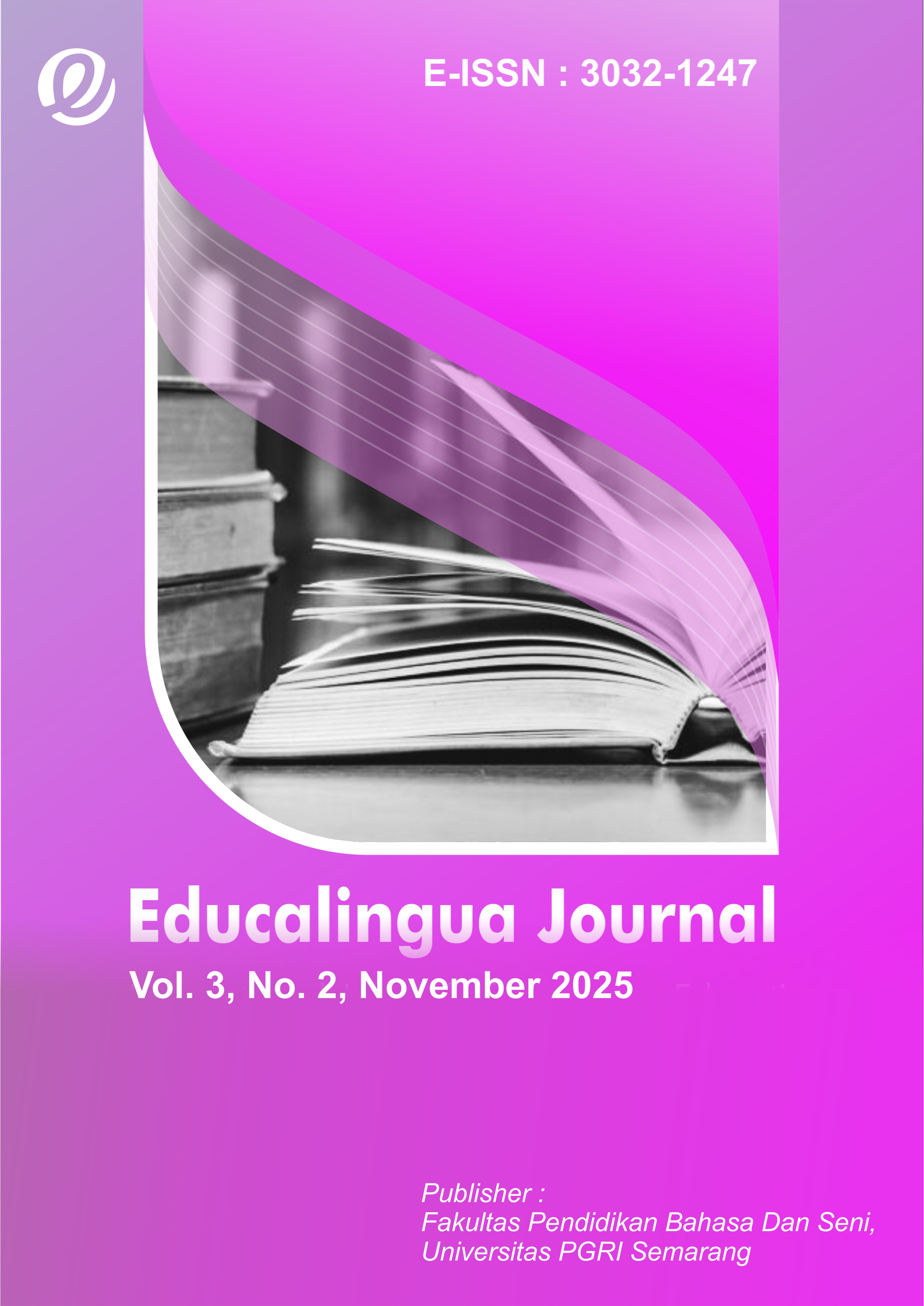Students’ Perceptions toward the Use of Podcast Video in Speaking Class
DOI:
https://doi.org/10.26877/educalingua.v3i2.2852Keywords:
Podcast video, Speaking achievement, Students’ perceptionsAbstract
This research aimed to find out students’ perception toward the use of podcast video in speaking class. This research was a case study. The participants were the second semester students of Speaking for Social Intercultural Class of English Department Study Program at Universitas Baturaja in the academic year of 2024/2025 with the total number of participants are 24 students. The data were collected through close-ended questionnaire and analyzed by percentage analysis and presenting data using tables. The result of the study showed that (1) Students had a good attitude toward the usage of podcast video in speaking class because podcast video is simple to utilize. Podcast video may help them learn to talk, and they are willing to use podcast video as an alternate method of learning to speak. Podcasts video can also motivate them since they attracted their interest. The podcast video's content and pronunciation of the native speaker could help them improve their talents. Furthermore, podcast video was easy to access; (2) The perception problems expressed by students regarding the use of podcast video in speaking class revealed that the length of the podcast is too long for them. Thus, they may get bored and lose their interest when watching a podcast video
References
Akhter, S. (2021). Exploring the significance of speaking skill for EFL learners. 509-Article Text-5185-1-10-20211125.
Bakhtiyor Zakirovich, G. (2023). Accuracy and fluency in language teaching. International Journal of Social Science & Interdisciplinary Research, 12(05), 19–25. https://www.gejournal.net/index.php/IJSSIR
Barlett, S., & Burton, D. (2024). Introduction to education studies. 63730.
Basenko, G., & Baskakova, V. (2021). Podcasts in the teaching media space. E3S Web of Conferences, 273, 12122. https://doi.org/10.1051/e3sconf/202127312122
Brown, H. D. (2014). Principles of language learning and teaching: A course in second language acquisition (6th ed.). Pearson Education.
Darwis, R. (2016). Students’ perceptions towards the use of podcast in learning English: A case study of the second grade students at one high school in Bandung. Journal of English and Education.
Duong, T. M. (2014). An investigation into effects of role-play in an EFL speaking course. Global Journal of Foreign Language Teaching, 4(2), 81–91.
Ghafar, Z. N., & Raheem, B. R. (2023). Factors affecting speaking proficiency in English language learning: A general overview of the speaking skill. Journal of Social Science, 2(9).
Harahap, S. D. (2020). Podcast impacts on students’ listening skill: A case study based on students’ perceptions. Jurnal Inovasi Penelitian, 1(4), 891–900. https://doi.org/10.47492/jip.v1i4.166
Hue, B. T. H., & Lan, T. T. T. (2024). A study on the use of supplementary materials in teaching English speaking skills at Tuyen Quang School for Excellence. European Journal of Contemporary Education and E-Learning, 2(4), 91–98. https://doi.org/10.59324/ejceel.2024.2(4).08
Indahsari, D. (2020). Using podcast for EFL students in language learning. JEES (Journal of English Educators Society), 5(2), 103–108. https://doi.org/10.21070/jees.v5i2.767
Kashinathan, S., & Abdul Aziz, A. (2021). ESL learners’ challenges in speaking English in Malaysian classroom. International Journal of Academic Research in Progressive Education and Development, 10(2), 983–991. https://doi.org/10.6007/IJARPED/v10-i2/10355
Kissová, O. (2020). Contrastive analysis in teaching English pronunciation. SWS Journal of Social Sciences and Art, 2(1), 39–65. https://doi.org/10.35603/ssa2020/issue1.03
Laiya, R. E., Khasanah, U., Sulistiani, I., Sudrajat, D., & M, M. (2022). Podcast-mediated students learning English in the second grade of senior high school. QALAMUNA: Jurnal Pendidikan, Sosial, dan Agama, 14(2), 1011–1024. https://doi.org/10.37680/qalamuna.v14i2.3749
Lee, D., & Yoon, S. N. (2021). Application of artificial intelligence-based technologies in the healthcare industry: Opportunities and challenges. International Journal of Environmental Research and Public Health, 18(1), 271. https://doi.org/10.3390/ijerph18010271
Muffels, N., & Van Weyenberg, A. (2024). The activating podcast method: Engaging students through blended learning. E-Learning and Digital Media. https://doi.org/10.1177/20427530241277898
Nunan, D. (Ed.). (2003). Practical English language teaching. McGraw-Hill.
Permatasari, I., Hutabarat, P. M., & Adelina, E. (2024). Exploring student satisfaction in learning with podcast applications: A qualitative study based on open-ended questions. 12(2).
Qureshi, M., Mahdiyyah, D., Mohamed, Y., & Ardchir, M. (2022). Scale for measuring Arabic speaking skills in early children’s education. Journal International of Lingua and Technology, 1(2), 114–130. https://doi.org/10.55849/jiltech.v1i2.81
Renisyifa, A., Sunarti, S., & Pebriyanti, A. (2022). Podcast media credibility as a means of fulfilling public information.
Riadil, I. G. (2020). A study of students’ perception: Identifying EFL learners’ problems in speaking skill. International Journal of Education, Language, and Religion, 2(1), 31. https://doi.org/10.35308/ijelr.v2i1.2256
Rosell-Aguilar, F. (2015). Podcasting as a language teaching and learning tool. In K. Borthwick, E. Corradini, & A. Dickens (Eds.), 10 years of the LLAS elearning symposium: Case studies in good practice (pp. 31–39). Research-publishing.net. https://doi.org/10.14705/rpnet.2015.000265
Samifanni, F. (2020). The fluency way: A functional method for oral communication. English Language Teaching, 13(3), 100. https://doi.org/10.5539/elt.v13n3p100
Schmitt, N. (2008). Vocabulary in language teaching (10th pr.). Cambridge University Press.
Sodikovna, B. S., & Botirovich, N. B. (2022). Grammar of the Russian language: Introduction to morphology, 2(8).
Sotlikova, R., & Haerazi, H. (2023). Students’ perceptions towards the use of podcasts in EFL classroom: A case study at a university of Uzbekistan. Journal of Languages and Language Teaching, 11(3), 461. https://doi.org/10.33394/jollt.v11i3.8172
Suseno, E. (2023). Using the podcast contents to help EFL students in improving their grammar and pronunciation. Journal Corner of Education, Linguistics, and Literature, 3(2), 108–120. https://doi.org/10.54012/jcell.v3i2.199
Tavakoli, P., & Wright, C. (2020). Second language speech fluency.
Umida Ochilovna, K., & Zarina Sameyevna, M. (2021). Improving speaking skill with the help of modern technologies. Galaxy International Interdisciplinary Research Journal, 9(12), 367–369.
Wake, A., Fox, K., & Strong, C. (n.d.). Pandemic podcasting: From classroom to bedroom. Teaching Journalism & Mass Communication, 10(1), 29–33.
Downloads
Published
Issue
Section
License
Copyright (c) 2025 Educalingua Journal

This work is licensed under a Creative Commons Attribution-NonCommercial-ShareAlike 4.0 International License.








